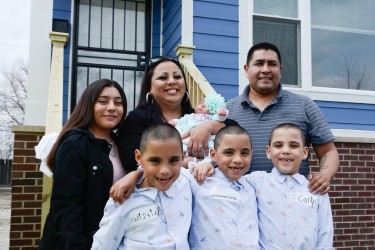WHY HOMEOWNERSHIP?
FINANCIAL
-
A home is typically the largest asset a family will have and its equity increases a family’s wealth over time.1
-
A typical homeowner will be ahead of a typical renter by a multiple of 45 on a lifetime financial achievement scale.2
-
Families living in affordable homes have been found to have double the discretionary income of their neighbors in high-cost housing, putting them in a position to buy health insurance, pay down debt, save for education or start a business.3
HEALTH
-
Homeowners have a significant health advantage over renters, on average. Homeowners are 2.5 percent more likely to have good health. When adjusting for an array of demographic, socioeconomic, and housing–related characteristics, the homeowner advantage increases to 3.1 percent.4
-
Families who live in quality housing experience fewer health issues, dedicate twice as much of their income on their health, and take more preventative measures to stay well.5
-
Homeowners report higher life satisfaction compared to renters.6
SOCIAL AND EDUCATION
-
Children who remain in a consistent learning environment are more likely to graduate from high school and college.5
-
Homeowners are 1.28 times more likely to become involved in a neighborhood group and 1.32 times more likely to join a civic association.7
-
The likelihood that a homeowner will vote in a local election is 65%, compared to 54% for renters.7
-
For children living in owned homes, math achievement is up to 9% higher, reading achievement is up to 7% higher, and children's behavioral problems are 1 to 3% lower.8
NEIGHBORHOOD STRENGTH
-
When housing is affordable and near transit or job centers, residents have stronger economic prospects and employers can more easily attract and retain staff.9
-
Providing decent, affordable, and stable housing is a human capital investment, similar to education or job training, that could strengthen and steady the American workforce.10
-
Lower crime rates occur when people move less often and are more present in their neighborhoods.11
Sources:
- https://www.urban.org/sites/default/files/publication/96221/homeownership_and_the_american_dream_0.pdf
- https://www.federalreserve.gov/publications/files/scf17.pdf
- https://www.lisc.org/media/filer_public/81/84/8184dd3f-ea67-40f2-82fb-6f8d7687df8f/052417_report_affordable_housing_families_neighborhoods_enterprise.pdf
- https://www.ncbi.nlm.nih.gov/pmc/articles/PMC4301401/
- https://www.nar.realtor/sites/default/files/documents/Homeownership-Stable-Housing2016.pdf
- https://www.tandfonline.com/doi/abs/10.1080/01944369408975571
- https://journalistsresource.org/studies/politics/citizen-action/homeowners-better-citizens-homeownership-community-participation-united-states/
- https://onlinelibrary.wiley.com/doi/abs/10.1111/1540-6229.t01-2-00053
- https://housingmatters.urban.org/articles/first-rung-ladder-economic-opportunity-housing
- https://scholar.harvard.edu/files/mdesmond/files/desmondgershenson.sp2016.pdf?m=1452638824
- https://www.huduser.gov/portal/periodicals/em/summer16/highlight2.html

